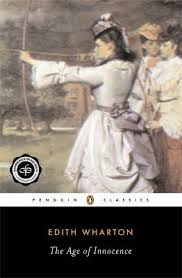Our book group choice for May 2010 is The Age of Innocence by Edith Wharton. Winner of the 1921 Pulitzer Prize, The Age of Innocence is Edith Wharton’s masterful portrait of desire and betrayal during the sumptuous Golden Age of Old New York, a time when society people “dreaded scandal more than disease.”
The Age of Innocence is a novel by Edith Wharton, set in New York City in the 1870s. The story follows Newland Archer, a young lawyer who is engaged to marry the beautiful May Welland. However, his world is turned upside down when May’s cousin, Countess Ellen Olenska, returns to New York after separating from her husband, a philandering Polish count. Ellen is a worldly and independent woman, and she quickly captures Newland’s heart.
Newland is torn between his love for Ellen and his duty to May. He knows that if he were to marry Ellen, he would be risking his social standing and his future career. But he also knows that he cannot live without her.
The novel explores the conflict between individual desire and social convention. Newland is a product of his time, and he is aware of the consequences of defying the expectations of his society. But he is also a passionate man, and he cannot deny his love for Ellen.
In the end, Newland chooses to stay with May. He knows that it is the safe choice, but he also knows that he is making a mistake. He will never forget Ellen, and he will always wonder what might have been.
The Age of Innocence is a beautifully written novel that captures the essence of a bygone era. It is a story of love, loss, and the struggle between individual desire and social convention.
Here are some of the themes of the novel:
- The conflict between individual desire and social convention
- The importance of family and tradition
- The nature of love and marriage
- The role of women in society
The Age of Innocence Discussion Questions
- Why does Archer neglect to tell Countess Olenska of his engagement to May Welland, despite the fact that May has instructed him to do so?
- Why does Archer suddenly realize that marriage is “not the safe anchorage he had been taught to think, but a voyage on uncharted seas”? (p. 35)
- Why does Archer feel “oppressed” when contemplating the “factitious purity” of his betrothed? (p. 37)
- Why is Countess Olenska a threat to the social order that claims Archer as one of its kind?
- Why is the neighborhood where Countess Olenska resides a “queer quarter for such a beauty to settle in”? (p. 99)
- To what is Archer referring when he thinks about his peers that “over many of them the green mould of the perfunctory was already perceptibly spreading”? (p. 103)
- What does Archer mean when he thinks that “it was wonderful that…such depths of feeling could coexist with such absence of imagination”? (p. 154)
- How does Archer feel about May’s talent with her bow and arrow? Why does he so often feel “cheated…into momentary well-being”? (p. 173)
- When Archer, at the request of Mrs. Mingott, follows the path to the shore to fetch Countess Olenska, why does he say to himself, “If she doesn’t turn before that sail crosses the Lime Rock light I’ll go back”? (p. 177)
- What kind of “code” exists between Archer and May? How does it work? What is its origin? (p. 219)
- Why does May decide to host the farewell dinner for the Countess Olenska? Why does Archer think of the dinner guests as “a band of dumb conspirators”? (p. 276)
- Why does Archer walk away from a potential reunion with Countess Olenska?

